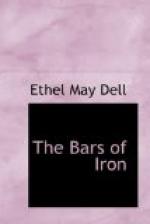“He hath broken the gates of brass,” she said. “And smitten the bars of iron in sunder.”
His fingers closed upon the edge of the pool. He felt the water splash his face as he sank down; and though he was too spent to drink he thanked God for bringing him thither.
Later it seemed to him that a Divine Presence came through the garden, that Someone stooped and touched him, and lo, his chains were broken and his burden gone! And he roused himself to ask for pardon; which was granted to him ere that Presence passed away.
He never knew exactly what happened after that night in the garden of the ruined chateau. There were a great many happenings, but none of them seemed to concern him very vitally.
He wandered through great spaces of oblivion, intersected with terrible streaks of excruciating pain. During the intervals of this fearful suffering he was acutely conscious, but he invariably forgot everything again when the merciful unconsciousness came back. He knew in a vague way that he lay in a hospital-tent with other dying men, knew when they moved him at last because he could not die, suffered agonies unutterable upon an endless road that never seemed to lead to anywhere, and finally awoke to find that the journey had been over for several days.
He tried very hard not to wake. Waking invariably meant anguish. He longed unspeakably for Death, but Death was denied him. And when someone came and stooped over him and took his nerveless hand, he whispered with closed eyes an earnest request not to be called back.
“It’s such—a ghastly business—” he muttered piteously—“this waking.”
“Won’t you speak to a friend, Piers?” a voice said.
He opened his eyes then. He had not heard his own name for months. He looked up into eyes that gleamed hawk-like through glasses, and a throb of recognition went through his heart.
“You!” he whispered, striving desperately to master the sickening pain that that throb had started.
“All right. Don’t speak for a bit!” said Tudor quietly. “I think I can help you.”
He did help, working over him steadily, with the utmost gentleness, till the worst of the paroxysm was past.
Piers was pathetically grateful. His high spirit had sunk very low in those days. No one that he could remember had ever done anything to ease his pain before.
“It’s been—so infernal,” he whispered presently. “You know—I was shot—through the heart.”
Tudor’s face was very grave. “Yes, you’re pretty bad,” he said. “But you’ve pulled through so far. It’s in your favour, that. And look here, you must lie flat on your back always. Do you understand? It’s about your only chance.”
“Of living?” whispered Piers. “But I don’t want to live. I want to die.”
“Don’t be a fool!” said Tudor.
“I’m not a fool. I hate life!” A tremor of passion ran through the words.




